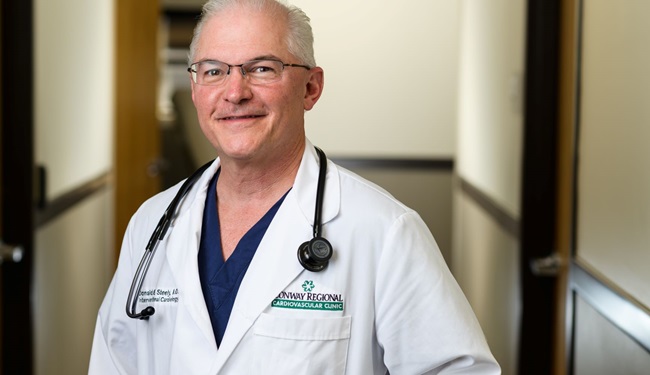Innovation in the time of COVID-19: Cardiologist adds video consults
On March 11, Don Steely became the first interventional cardiologist in central Arkansas to insert the new, upgraded model of the miniature pacemaker. Micra™ AV, is the world’s smallest pacemaker with atrioventricular (AV) synchrony, according to Medtronic, the manufacturer. Micra AV expands the number of people who can receive leadless pacemaker therapy. This new device, indicated for the treatment of patients with AV block, extends the most advanced pacing technology – at one-tenth the size of a traditional pacemaker – to additional patients.

As the world and nation adjust to a new normal created by the COVID-19 pandemic, the health care industry looks to telemedicine as an innovative method of care.
It is often in times of challenge that innovation emerges. As the nation navigates COVID-19, the call for social distancing has expedited the arrival of telemedicine. Numerous medical specialists have begun using video technology to follow-up on their patients from the safety of their homes.
Telemedicine provides an avenue to physicians where they may have had limited access before.
Through telemedicine, Dr. Don Steely, an interventional cardiologist with Conway Regional Health System, regularly visits with patients from their homes. “It’s cool. I learn about their dogs, cats, and grandkids while I’m finding out about my patients’ health,” he said.
Steely believes the next step for him will be extending those video visits to patients at smaller hospitals in communities such as Clinton, Dardanelle, and other areas of north central Arkansas. “In the future, a nurse at one of these hospitals could take vital signs (heart rate, blood pressure, pulse oxygen) and I could look at the results on my phone and ask the patient questions,” said Steely. “Patients in hospitals without a cardiologist on their staff could still have access to one via telemedicine.”
This access to telemedicine, Steely says, will allow him to see more inpatients. “It’s going to open up spots for more first-time patients,” he said. “Overall, more people will be able to access a cardiologist.”
Since the COVID-19 pandemic began, Steely has been visiting with about one-third of his patients via telemedicine appointments.
Alexa Shipp, an Advanced Practice Registered Nurse who practices in the Conway Regional Heart Clinic alongside Steely, had video visits with 14 of the 15 patients she saw during a recent clinic day. Steely is scheduling telemedicine appointments through the Conway Regional Cardiovascular Clinic.
Steely’s weekly onsite visit to Ozark Health in Clinton traditionally includes a full-day of in-person visits with new or follow-up cardiology patients. Nowadays, he is also using his breaks to provide video follow-up consults with his patients in other areas of north central Arkansas.
Micra Pacemakers
An interventional cardiologist with more than 20 years in practice, Steely has embraced technological changes.
In 2018, he was one of the first interventional cardiologists in Arkansas to begin implanting Micra VR pacemakers for patients with bradycardia (slow heart rhythms Micra pacemakers, which are one tenth the size of traditional pacemakers. The Micra pacemakers are much less invasive and last longer than traditional pacemakers. Because they do not use cardiac leads, the pacemakers are barely visible.
On March 11, Steely became the first interventional cardiologist in central Arkansas to insert the new, upgraded model of the miniature pacemaker. Micra™ AV, is the world’s smallest pacemaker with atrioventricular (AV) synchrony, according to Medtronic, the manufacturer. Micra AV expands the number of people who can receive leadless pacemaker therapy. This new device, indicated for the treatment of patients with AV block, extends the most advanced pacing technology – at one-tenth the size of a traditional pacemaker – to additional patients.
AV block is a type of heart block in which the electrical signals between the chambers of the heart (the atria and the ventricles) are impaired. A pacemaker is the most common way to treat AV block. Pacemakers help restore the heart's normal rhythm and relieve symptoms by coordinating the electrical activity of the atria and the ventricles. When this process – known as AV synchrony – is achieved, patients are healthier and have improved quality of life due to increased blood flow from the left ventricle of the heart.
Comparable in size to a large vitamin, Dr. Steely opted to use Medtronic’s Micra AV based on its ability to deliver therapy via a minimally invasive approach. During the implant procedure, the device is inserted through a catheter and implanted directly into the heart with small tines. Because Micra AV does not require leads or a surgical "pocket" under the skin, potential sources of complications related to leads and pockets are eliminated - as are any visible signs of the device.
The updated Micra AV was approved by the U.S. Food and Drug Administration in January 2020.
Micra Pacemakers available through the Conway Regional Cardiac Catheterization Laboratory:
MICRA AV expands the number of people who can receive leadless pacemaker therapy. Unlike, MICRA VR, MICRA AV can treat patients with AV Block, a condition in which the electrical signals between the chambers of the heart (the atria and the ventricle) are impaired. MICRA AV can detect mechanical movement of a beat in one chamber of the heart-the atrium-and then deliver electricity to another chamber where MICRA AV is implanted-the ventricle-so the atrium and ventricle beat in synchrony.
MICRA VR is for patients with bradycardia (slow heart rhythms), where it is unnecessary to deliver electricity to the atria (the chambers at the top of the heart). Most patients who fall into this group are those who have permanent atrial fibrillation, in whom it is impossible to deliver electricity(pace) the atria when this rhythm is present.
(Originally published in AY magazine)